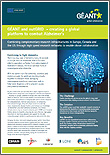GÉANT and outGRID – underpinning a global neuroscience grid infrastructure
The Challenge
The incidence of neurodegenerative diseases, such as Alzheimer’s, is rising rapidly, impacting the lives of patients and carers and adding greatly to healthcare costs around the world. Consequently research into potential cures and earlier diagnosis is an increasingly vital area of medical research. Over the last five years regional grid-based
 scientific infrastructures have developed to study and research neurodegenerative conditions. Given the global nature of research the challenge is to link these seamlessly.
scientific infrastructures have developed to study and research neurodegenerative conditions. Given the global nature of research the challenge is to link these seamlessly.
The Solution
The outGRID project provides the first step towards creating a global neuroscience infrastructure by driving technical and network interoperability between the European neuGRID, Canadian CBRAIN and US LONI initiatives to benefit worldwide research. The growth and power of grid computing combined with high speed research networks such as GÉANT has provided the processing power to allow those investigating neurodegenerative diseases to take major steps forward.
Key Benefits
outGRID has brought together the global neuroscience grid community through a combination of information sharing, workshops and international technical collaboration, and is underpinning the construction of a huge international user-oriented infrastructure that allows worldwide collaboration for both research and faster patient diagnosis.
|
“The success of outGRID demonstrates the feasibility of connecting research infrastructures across the globe through high speed research networks, making data and resources available to scientists and doctors, wherever they are located. Not only does this show what can be achieved through closer worldwide neuroscience collaboration, but it provides a blueprint for other disciplines, showing the advantages of creating global platforms to drive forward critical research that directly benefits us all in area such as human health.” Dr Arthur Toga, founder and director of LONI and co-principal investigator, Global Alzheimer’s Association Interactive Network (GAAIN). |
|---|
|
Partners in the project: |
|---|
|
IRCCS-FBF |



